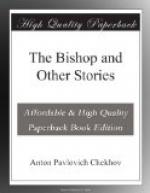When he had finished his prayers he undressed and lay down, and at once, as soon as it was dark, there rose before his mind his dead father, his mother, his native village Lesopolye . . . the creak of wheels, the bleat of sheep, the church bells on bright summer mornings, the gypsies under the window—oh, how sweet to think of it! He remembered the priest of Lesopolye, Father Simeon—mild, gentle, kindly; he was a lean little man, while his son, a divinity student, was a huge fellow and talked in a roaring bass voice. The priest’s son had flown into a rage with the cook and abused her: “Ah, you Jehud’s ass!” and Father Simeon overhearing it, said not a word, and was only ashamed because he could not remember where such an ass was mentioned in the Bible. After him the priest at Lesopolye had been Father Demyan, who used to drink heavily, and at times drank till he saw green snakes, and was even nicknamed Demyan Snakeseer. The schoolmaster at Lesopolye was Matvey Nikolaitch, who had been a divinity student, a kind and intelligent man, but he, too, was a drunkard; he never beat the schoolchildren, but for some reason he always had hanging on his wall a bunch of birch-twigs, and below it an utterly meaningless inscription in Latin: “Betula kinderbalsamica secuta.” He had a shaggy black dog whom he called Syntax.
And his holiness laughed. Six miles from Lesopolye was the village Obnino with a wonder-working ikon. In the summer they used to carry the ikon in procession about the neighbouring villages and ring the bells the whole day long; first in one village and then in another, and it used to seem to the bishop then that joy was quivering in the air, and he (in those days his name was Pavlusha) used to follow the ikon, bareheaded and barefoot, with naive faith, with a naive smile, infinitely happy. In Obnino, he remembered now, there were always a lot of people, and the priest there, Father Alexey, to save time during mass, used to make his deaf nephew Ilarion read the names of those for whose health or whose souls’ peace prayers were asked. Ilarion used to read them, now and then getting a five or ten kopeck piece for the service, and only when he was grey and bald, when life was nearly over, he suddenly saw written on one of the pieces of paper: “What a fool you are, Ilarion.” Up to fifteen at least Pavlusha was undeveloped and idle at his lessons, so much so that they thought of taking him away from the clerical school and putting him into a shop; one day, going to the post at Obnino for letters, he had stared a long time at the post-office clerks and asked: “Allow me to ask, how do you get your salary, every month or every day?”
His holiness crossed himself and turned over on the other side, trying to stop thinking and go to sleep.
“My mother has come,” he remembered and laughed.




